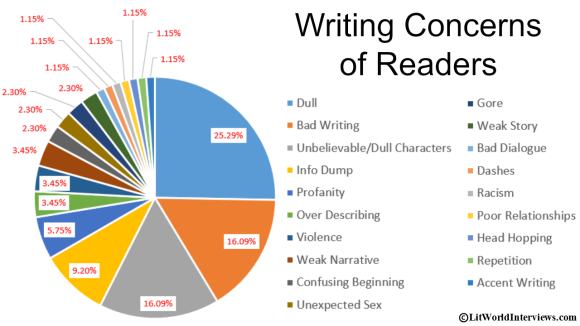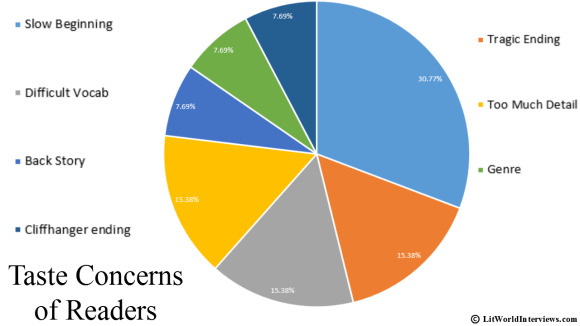I want you to look at these two charts. They are basically WHY READERS STOP READING A BOOK.
Chart 1 says the biggest reasons are:

25% stop reading because it’s DULL
16% stop because of bad writing (more on that in a sec)
16% DULL characters or characters who are unbelievable
9% stop because you fed them an inedible info dump
Let’s pause there. This means if you have engaging characters and start your story with something interesting – putting that interesting thing up front, like the opening paragraph – and you don’t write BAD, you will have avoided more than 66% or two-thirds of the reason people stop reading a book!
Gang, if you can easily avoid 2/3 of a problem, avoid it.
Bad writing is subjective, but let’s assume it means typos, poor grammar, and improper punctuation. Again, easily avoided.
So: avoid.
And do what instead?
Start with something super interesting.
- A murderer spying on his next victim.
- A woman twisting off her wedding ring before she sits down to lunch with a co-corker
- A first kiss.
- A person struggling to light matches over a can of gasoline.
See? Don’t we want to read on to see what happens next? Of course we do!
So do that. And make your characters engaging. Fun. Likable. Give them personalities you’d want to hang out with – because that’s what we’re asking readers to do, to hang out with these make believe people for a while.
On to chart 2.
Chart 2 is a different version of chart 1, but let’s see what it tells us.

30% of readers worry that the book will start slow. That indicates a dull read to come.
15% fear a tragic ending. Okay, but we have to get to the ending first, so table that for now.
15% fear difficult vocabulary. Mist of you won’t give them that, so you’re clear there.
15% fear TOO MUCH DETAIL – as in, boring stuff that seems irrelevant at the time, slow pace, dull plot.
7% fear a big boring back story, which is really part of too much detail
Genre and cliffhanger ending means they THINK it’s one genre and it turns out to be something else; cliffhanger ending means the book suddenly stops but the story isn’t finished, so they have to buy another book. That’s not cool. That pisses people off. Don’t do that.
So again, we can avoid nearly 100% of the things readers are worried about – and will stop reading if they encounter them – if we start fast and keep it interesting.
And a tragic ending can make a story sensational. Titanic. Love Story. Gallipoli. Dr Zhivago. Romeo and Juliet. They ALL have tragic endings. Fans love as good tearjerker. They don’t like a nonsensical, everybody dies ending that happens because the writer got tired and the deadline was due.
So the lesson is: avoid what you can avoid.
Sure, but do what instead?
- Write so that something super interesting happens on the first page, in the opening paragraph if possible. James Patterson said make sure something interesting happens on every page. Keep the story fast paced. Make the characters engaging, human, flawed, loving, sympathetic, unique. It’s not that hard.
2. Write your story, then let it rest. When you reread it, anything you want to skim, highlight in yellow. Anything you DO skim, highlight in red. Everything you read thoroughly, highlight in green.
- Yellow stuff, cut by 50%.
- Red stuff cut by 90%.
As Stephen King said, cut it to the bone.
(Oh, and an outline will keep writers block away.)
All this does is make your story lean and mean, so if you have assigned the proper genre to it, readers can’t put it down. READERS LOVE A BOOK THEY CAN’T PUT DOWN.
Not avoiding these easily avoided items causes your book to get bad reviews and weak sales.
Your choice.


8 replies on “Why Readers STOP Reading Your Book”
Great tips Dan. Working in book two and been doing a fair amount of cutting/re-writing after beta comments. 🙂
LikeLiked by 1 person
Yep. Trust the betas!
LikeLiked by 1 person
I do! Lol. 🙂
LikeLiked by 1 person
Good advice, Dan. I find the beginning the most difficult. Capturing the reader’s attention in the first paragraph.
LikeLiked by 1 person
Here’s the trick to that: write your story, then revisit chapter 1. Make sure you have fully formed characters on page 1 – often we writer types learn about them over the first few chapters. Then, rearrange the first chapter to put something interesting in the first paragraph. What’s the most interesting thing in Ch 1? Try to move that to the opening paragraph. When you’ve written the story it easier to see what’s important.
LikeLike
Very interesting stats. Thanks for collecting them. I am shocked to see the category for dashes! I’m in trouble then because I do so love my dashes.
LikeLiked by 1 person
I’d give a better reply but I gotta dash
LikeLike
Great advice, Dan. Lots to think about here.
LikeLike